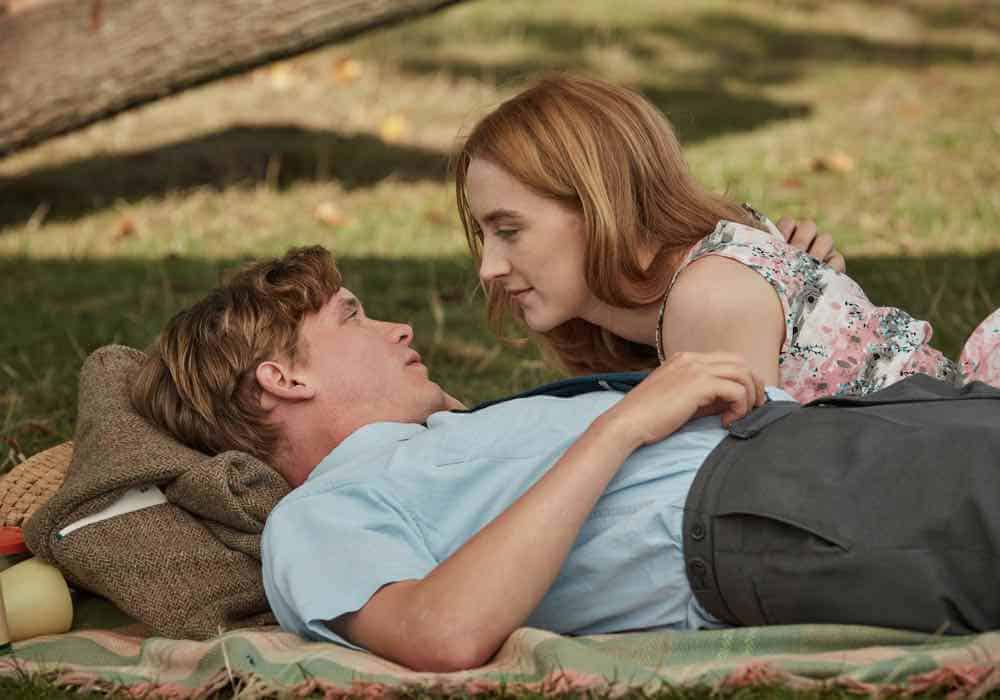In this interview, Breakout star Billy Howle discusses how he prepared to embody his On Chesil Beach character, Edward, throughout the years — creating his voice, movement, and character.
Read the rest of our On Chesil Beach Special Issue here. Our interview with Billy Howle is one of many interviews featured in the Special Issue.

When Billy Howle made On Chesil Beach, he was a virtual unknown, but he won’t be for much longer. At 26, Howle has been quietly working away in the theatre for several years, including on two collaborations with British theatre legend Richard Eyre; he took over as Oswald from Jack Lowden in the New York transfer of Ghosts. On Chesil Beach is not Howle’s big screen debut — he had roles in The Sense of an Ending and Dunkirk — but it is his first meaty on screen role. Howle rises to the challenge in this star-making turn.
Listen to our podcast on On Chesil Beach and Normal People
Howle plays Edward, the film’s working class protagonist, who fell in love with a posh woman, Florence (Saorise Ronan), and is fumbling through his wedding night in 1960 when the film begins. Much divides them: class, wealth, and experience. Those differences are both what pushed them together and what could so easily drive them apart. Both are desperately trying to play the part of married grown ups, and that performance gets in the way of communicating with each other. In the hotel room on their wedding night, Howle reveals how uncomfortable Edward is in his new role as married man — and how desperately he’s trying to hide it. In small, private moments, Howle exposes Edward’s vulnerability without giving away the game to the people he’s trying to perform for.
[clickToTweet tweet=”‘Howle exposes Edward’s vulnerability without giving away the game to the people he’s trying to perform for.'” quote=”‘Howle exposes Edward’s vulnerability without giving away the game to the people he’s trying to perform for.'”]
Because the film flashes backward and forward in time, Howle plays multiple versions of Edward: the new bashful graduate, the boy falling in love, the engaged man, the newly married man, the middle aged man, and finally the elderly gentleman. Howle’s impressive physical transformation across all these years shows Edward’s evolution and adaptation to the society he lives in.
After the film’s premiere at the Toronto International Film Festival, I sat down with Billy Howle for an interview to discuss how he prepared to embody Edward throughout the years — creating his voice, movement, and character.

Seventh Row (7R): How did you approach creating your character, Edward, and his physicality?
Billy Howle: On this one, I knew I had a fair challenge in the physical nature of the piece. The background of the piece and the time period itself is very, very specific regarding mannerism, physical behaviour. Particularly in public, how people interacted with one another was very different.
Also, how they held themselves, and then how that developed for a person who’s in their 20s in 1962, and how that changed, throughout the ‘60s and into the 70s. In 1975, being in your mid-30s is very different from being a young man at that point because you’re already fairly developed.
There was the further exploration of him becoming an old man. Every event in your life has an impact on you: on your voice, on the way you interact with others physically. All of those things have to be taken into consideration.
[clickToTweet tweet=”‘Every event in your life has an impact on you: on your voice, the way you interact with others physically.’ – Howle” quote=”‘Every event in your life has an impact on you: on your voice, on the way you interact with others physically.’ – Howle”]
For this, I started very specifically with movement. We had someone called Imogen Knight who was the movement coach. We worked very closely together, particularly regarding the physicality of an older Edward.
The next bit, for me, was music. A really good way in for this, time-period-wise, and the jumps, was the music of the time, and specifically, what Edward would have been listening to: going from the British Blues scene, which is a very specific type of music history, through to 1975 with T-rex, and how that would have evolved, as well. That was a really fascinating thing for me, and that really helped my journey.
[clickToTweet tweet=”‘A really good way in, time-period-wise, was the music, what Edward would have been listening to.'” quote=”‘A really good way in, time-period-wise, was the music, what Edward would have been listening to.'”]
7R: When the film is set, there are a lot of strict rules about appropriate behavior. How did those constraints help or hinder or into developing Edward?
Billy Howle: Even post-war, there’s still this Victorian hangover, I like to call it. That informs movement and clothes. Clothes have a huge impact on how a person moves and behaves. High-waisted trousers definitely change the way a man would walk. The shoe, the footwear he wore… Edward’s different ‘cause he’s wearing plimsolls all the time and never wears shoes, I think that’s mentioned in the film. That’s the first thing.
[clickToTweet tweet=”‘Even post-war, there’s still this Victorian hangover, I like to call it. That informs movement and clothes.'” quote=”‘Even post-war, there’s still this Victorian hangover, I like to call it. That informs movement and clothes.'”]
Secondly, there’s this — I don’t think straightjacketed is the right word, I’ve heard people describe it as that — suppressed state of being and physical existence. Specifically, for men of the time, around women, there’s a certain way of behaving and moving. As in any point in history, there’s this notion of prowess and wanting to impress a female, wooing, and how that was done.
[clickToTweet tweet=”‘Clothes have a huge impact on how a person moves and behaves.’ – Billy Howle” quote=”‘Clothes have a huge impact on how a person moves and behaves.’ – Billy Howle”]
That first instance, when Florence and Edward see one another in the C&D meeting, that’s quite a good example of already quite a liberated, free flowing movement. You’ve got that whole sequence where Edward gets on his bike, and he’s going down the hill. There’s a sort of bucolic freedom that he already has, particularly in his movement. [clickToTweet tweet=”‘There’s a sort of bucolic freedom that he already has, particularly in his movement.’ – Billy Howle” quote=”‘There’s a sort of bucolic freedom that he already has, particularly in his movement.’ – Billy Howle”]It’s not until the later scenes — or actually, where we open the film, in the hotel — and you see him in this suit, and it’s a real noticeable change. His hair’s not floppy. There’s this definite pressure on Edward to behave in a certain way.
There’s themes of toxic masculinity and how that represses certain things in a man. Obviously, an expression of compassion or sensitively, or patience even, can be expressed physically. You don’t see a lot of that in the hotel room scenes. That’s this whole kind of physical language, which feeds into voice, as well, and this sort of very proper way of speaking — everything having a finality to it, and every motion being, not preempted, but conscious.
There’s a different sort of self-consciousness in their behaviour towards one another. And that’s quite interesting. Particularly for young men, again today, self-consciousness can lead people to make mistakes sometimes — being overly conscious of how you’re behaving towards another person, and second guessing yourself the whole time, while being kind of true and honest in your expression.
7R: How did you approach finding the spoken voice for Edward at different stages of his life?
Billy Howle: There’s a symbiosis of mind, body, and voice. I think a lot of the vocal things and qualities of voice — it’s affected by so many variables. A lot of those I found out through research: the culture and the vernacular of the day was very specific, and of course, all the words themselves are already written.
[clickToTweet tweet=”‘There’s a symbiosis of mind, body, and voice. Qualities of voice—it’s affected by so many variables'” quote=”‘There’s a symbiosis of mind, body, and voice. Qualities of voice—it’s affected by so many variables'”]
You have a responsibility to adhere to certain things that happened at the time, [like] vocal habits. I think Dom [Cooke] also mentioned in the Q and A, finishing each sentence, and everything having a sort of finality about it. There’s no “umm”ing and “aah”ing as there is today, quite a lot, people saying “like”. That was one of the really big things, particularly in the 1960s.
It’s about finding a contrast and really making a noticeable difference between the time periods — particularly, how time affects each person, and in turn, has a profound effect on your voice and the spoken voice. Any sort of trauma, any sort of emotional thing, could have an effect on the way somebody speaks, the sound of their voice, and the quality of it. There’s no surefire way of knowing what that will be or how it will affect someone.
[clickToTweet tweet=”‘Trauma could have an effect on the way somebody speaks, the sound of their voice, the quality of it.'” quote=”‘Trauma could have an effect on the way somebody speaks, the sound of their voice, the quality of it.'”]
Those were just things I was thinking about throughout the process. Then, I do the groundwork, and then allow it to evolve and become whatever it becomes. So that final bit, I don’t impose anything. It’s quite nice to settle into something. I feel like a character’s voice eventually arises out of there, albeit quite subtly sometimes.
7R: When you’re talking about trauma, do you mean that’s affecting the character generally over many scenes or do you mean in individual scenes?
Billy Howle: Well, it can be either. It could be a lifelong trauma, if you like, an emotional impact that a single event has had or a series of events. Even physical trauma affects the voice and everything about a person’s physicality. That’s kind of fascinating. It’s a very imprecise art, but that’s the beauty of it. You have the freedom to assign something to an event or an environment in which that person lives, or exists, and how that has an effect on the way they speak or how they interact with other people. It all becomes a sociological experiment.
[clickToTweet tweet=”‘The voice is like a sort of artifact. When you take off the first layer of dust, something comes to the surface.'” quote=”‘The voice is like a sort of artifact. When you take off the first layer of dust, something comes to the surface.'”]
The voice is like a sort of artifact. When you take off the first layer of dust, something comes to the surface. The voice itself is something that evolves over time and with age. It’s very interesting, a very malleable tool.
This interview was originally published on October 2, 2017.
Read the rest of our Special Issue on On Chesil Beach here.
At Seventh Row, we pride ourselves on spotting exciting new acting talent. Last year, we wrote career retrospectives on up-and-comers Josh O’Connor (God’s Own Country, The Durrells) and Jack Lowden (Dunkirk, War & Peace, Tommy’s Honour). We recently spotlighted five breakout performances at the 2018 Sundance Film Festival. And we’ve written about why unsung character actors like John Cho, Rebecca Hall, and Andre Holland should really be movie stars by now.

